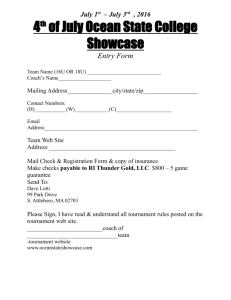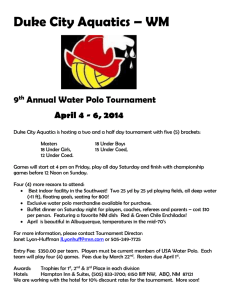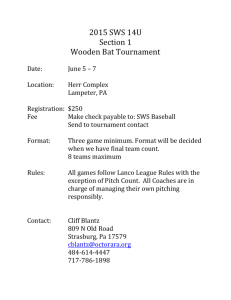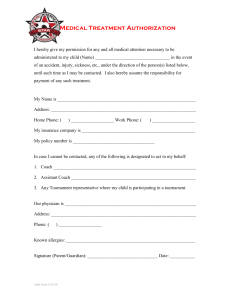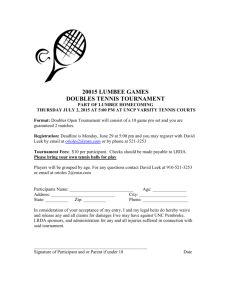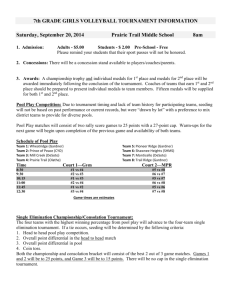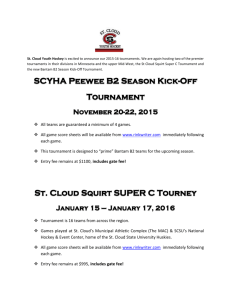NFA CODE OF ETHICS, RULES AND PROCEDURES A. Directors
advertisement
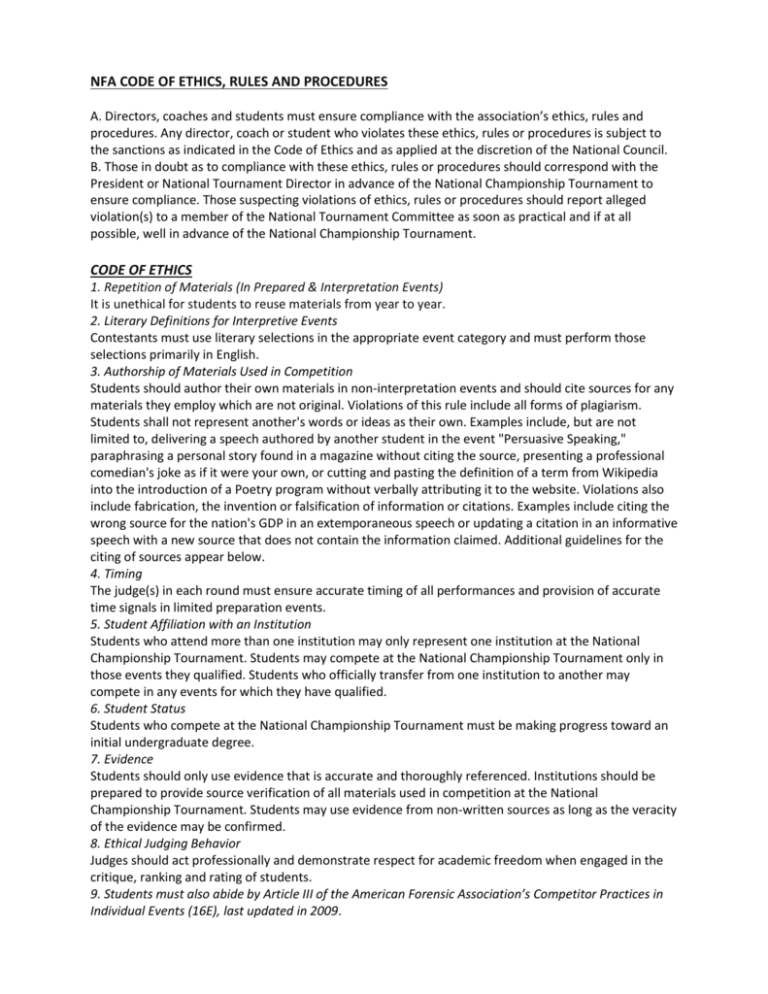
NFA CODE OF ETHICS, RULES AND PROCEDURES A. Directors, coaches and students must ensure compliance with the association’s ethics, rules and procedures. Any director, coach or student who violates these ethics, rules or procedures is subject to the sanctions as indicated in the Code of Ethics and as applied at the discretion of the National Council. B. Those in doubt as to compliance with these ethics, rules or procedures should correspond with the President or National Tournament Director in advance of the National Championship Tournament to ensure compliance. Those suspecting violations of ethics, rules or procedures should report alleged violation(s) to a member of the National Tournament Committee as soon as practical and if at all possible, well in advance of the National Championship Tournament. CODE OF ETHICS 1. Repetition of Materials (In Prepared & Interpretation Events) It is unethical for students to reuse materials from year to year. 2. Literary Definitions for Interpretive Events Contestants must use literary selections in the appropriate event category and must perform those selections primarily in English. 3. Authorship of Materials Used in Competition Students should author their own materials in non-interpretation events and should cite sources for any materials they employ which are not original. Violations of this rule include all forms of plagiarism. Students shall not represent another's words or ideas as their own. Examples include, but are not limited to, delivering a speech authored by another student in the event "Persuasive Speaking," paraphrasing a personal story found in a magazine without citing the source, presenting a professional comedian's joke as if it were your own, or cutting and pasting the definition of a term from Wikipedia into the introduction of a Poetry program without verbally attributing it to the website. Violations also include fabrication, the invention or falsification of information or citations. Examples include citing the wrong source for the nation's GDP in an extemporaneous speech or updating a citation in an informative speech with a new source that does not contain the information claimed. Additional guidelines for the citing of sources appear below. 4. Timing The judge(s) in each round must ensure accurate timing of all performances and provision of accurate time signals in limited preparation events. 5. Student Affiliation with an Institution Students who attend more than one institution may only represent one institution at the National Championship Tournament. Students may compete at the National Championship Tournament only in those events they qualified. Students who officially transfer from one institution to another may compete in any events for which they have qualified. 6. Student Status Students who compete at the National Championship Tournament must be making progress toward an initial undergraduate degree. 7. Evidence Students should only use evidence that is accurate and thoroughly referenced. Institutions should be prepared to provide source verification of all materials used in competition at the National Championship Tournament. Students may use evidence from non-written sources as long as the veracity of the evidence may be confirmed. 8. Ethical Judging Behavior Judges should act professionally and demonstrate respect for academic freedom when engaged in the critique, ranking and rating of students. 9. Students must also abide by Article III of the American Forensic Association’s Competitor Practices in Individual Events (16E), last updated in 2009. This section of the AFA’s Student Code is appended below. In addition to our own code of ethics, these rules from an affiliate organization, the AFA, will be enforced at the NFA’s National Championship Tournament. Code of Forensic Program and Forensic Tournament Standards for Colleges and Universities The American Forensic Association (2009) ARTICLE III: COMPETITOR PRACTICES IN INDIVIDUAL EVENTS 1. Students competing in individual events are expected to provide sufficient support for their claims. The ethical use of evidence includes appropriate citations, accurate representation of evidence content, and avoidance of plagiarism and reflection of autonomous student work. 2. Appropriate Citations of Evidence: Outside sources shall be verbally cited during the speech. A verbal citation shall include sufficient information for an audience member to locate the source. The AFA-NIET recommends the following (additional information may be included): A. Print periodicals shall be cited with the title of the periodical and date of the publication regardless if the material was electronically retrieved. The date a source is accessed online is not considered the primary publication date. For example: “According to the May 21, 2009, New York Times” B. Materials distributed via electronic means only should be indicated as such. For example: “According to a May 21, 2009 online report by the Associated Press” C. Books shall be cited with the title, date and author. Essays or articles collected in an anthology should be cited using the primary author’s name not the editor of the collection. When applicable, students should find and cite the original publication of the anthologized work. For example: “Augusto Boal argues in his 1979 book Theatre of the Oppressed” D. Webpages shall be cited using either a brief URL or the name of the sponsoring organization and the date on which the page was posted. In absence of a posted-on date, students should use the date the page was last updated. The date a source is accessed online is not considered a primary publication date. For example: “As reported on www.ptoweb.org last updated May 2009” and “The AFA-NIET states on its website last updated April 10, 2009.” E. Interviews shall be cited with the name of the interviewee, his/her qualifications and the date on which the interview occurred. Interviews include facetoface, email, chat, facebook, and other forms of electronic exchange. For example: “In an email correspondence on July 7, 2009 with Joe White, former Chair of the Tucson, AZ Habitat for Humanity Board of Directors” 3. Accurate Representation of Evidence: When incorporating evidence into a speech, students shall avoid the following: A. Citing evidence out of context B. Misinterpreting evidence to alter intent or meaning C. Cutting words from or adding words to a quotation or paraphrase in such a way that the intent or meaning of the evidence is altered 4. Avoidance of Plagiarism: In individual events which require the construction of the speech to be the original work of the student (persuasion, informative, after-dinner, communication analysis (rhetorical criticism), impromptu, extemporaneous, or other similar speaking events) the speaker shall not commit plagiarism. A. Plagiarism is defined as claiming another's written or spoken words as one's own, or claiming as one's own a significant portion of the creative work of another. B. A speech in individual events competition is considered plagiarized when the student presenting it was not the principal person responsible for researching, drafting, organizing, composing, refining, and generally constructing the speech in question 5. Reflection of Autonomous Student Work: Forensics competitors are expected to do their own research. A. Persons other than competitor (e.g., undergraduate students, graduate students, instructors/coaches) are not to be charged with the responsibility of doing a forensics competitor's research. B. This provision shall not be construed to prevent coaches or assistants from engaging in limited research designed to: i. Teach research techniques, ii. Provide examples of high quality research or, iii. Identify areas of research for students 6. Ethical Use of Literature in Individual Events (as iterated in the AFA-NIET Charter/Bylaws) A. Contestants may not rewrite a prose, a poem, or a dramatic text so the work differs from the original text. B. Contestants may not add or reassign scenes or lines to the performed cutting. Although an occasional line might be added, especially if a character has been deleted, this practice should be discouraged. C. Contestants may not rewrite the ending of a work. D. Contestants may not rewrite lines to change the gender or person of a character. E. Contestants may not perform a text in a genre for which it has not been written. 10. Protest of ethical violations should be filed in writing with the tournament director of the National Championship Tournament. VIOLATION(S) OF ETHICS, RULES AND PROCEDURES 1. Challenges or disputes arising from the provisions of the association must be submitted in writing to a member of the National Tournament Committee (the President of the association, the National Tournament Director or the Vice President for Administration). The written challenge must include the violation, a statement of the nature of the violation, the name of the alleged offender, the school they represent, and, if possible, any evidence in support of the allegation of violation. The National Tournament Committee will make a preliminary review of the written challenge as soon as practical and within 24 hours if the allegation occurs during the National Championship Tournament. The National Tournament Committee will utilize any and all means at its disposal to determine the validity of the allegations and the circumstances of the situation(s) surrounding them, including video and audio tapes, student manuscripts, ballots, judges' comments, etc. Any person in attendance at the National Championship Tournament may file a challenge for violation of any alleged violation. 2. After the preliminary review of the National Tournament Committee of a written challenge, the National Tournament Committee will report its findings to the National Council. The National Council will either conduct a formal hearing to investigate the allegation, dismiss the allegation, or defer action until further evidence can be made available. All parties involved will be given notice of the National Council's actions. Public notice of the National Council’s ruling will be given to all member institutions. 3. The National Council may request written statements, oral testimony or interrogatories from those involved in the allegations. Failure to cooperate in the National Council's investigation will be considered a violation and subject to the penalties noted elsewhere. 4. The National Council will keep accurate records of its proceedings and any testimony received in connection with an allegation of violation(s). These records will be confidential and subject to disclosure only to the person or persons alleged to be in violation. Individuals may petition the National Council in writing to have their testimony exempted from confidentiality provisions. 5. The findings of the National Council in an allegation of violation are subject to appeal to the National Assembly. SANCTIONS FOR VIOLATIONS 1. The National Council, after its deliberations and a determination by 2/3 vote of the members present and voting, may impose penalties for violation of ethics, rules, and/or procedures. The imposition of penalties will be made public, as will the votes of the individual Council members to impose penalties. Student representatives of the National Council will not take part in the investigation of violations nor will they be permitted to vote in such matters if the challenge is presented during the National Championship Tournament. 2. For violations involving a specific event, the penalties will be selected from the following: A. Disqualification from the event in question; B. Issuance of letter(s) of censure to the individual(s) and/or institution(s) in violation; C. Issuance of letter(s) of reprimand to the individual(s) and/or the institution(s) in violation; D. Disallowance of sweepstakes points or honors achieved in the event in question. E. Prohibition from attendance at future national competitions. 3. For violations involving eligibility, the penalties will be selected from the following: A. Disqualification from the National Championship Tournament; B. Issuance of letter(s) of censure to the individual(s) and/or the institution(s) in violation; C. Issuance of letter(s) of reprimand to the individual(s) and/or the institution(s) in violation; D. Disallowance of sweepstakes points or honors achieved at the National Tournament, E. Prohibition from attendance at future national competitions. 4. For violations involving conduct of a coach and/or a judge, the penalties will be selected from the following: A. Issuance of letter(s) of reprimand to the individual(s) and/or the institution(s) in violation; B. Disallowance of sweepstakes points for the institution(s) the individual(s) represents; C. Prohibition from attendance at future national competitions.
